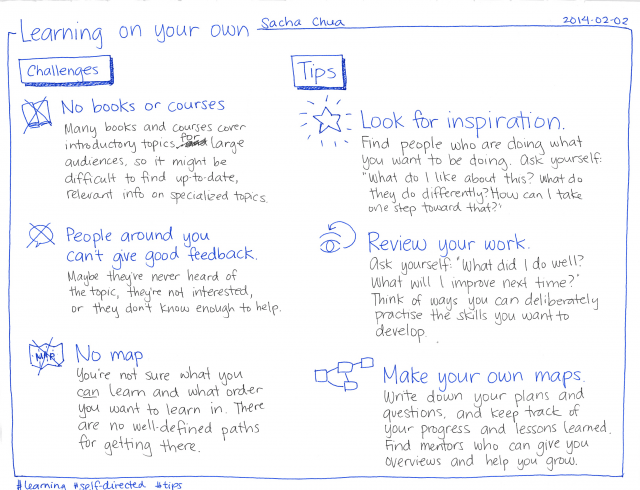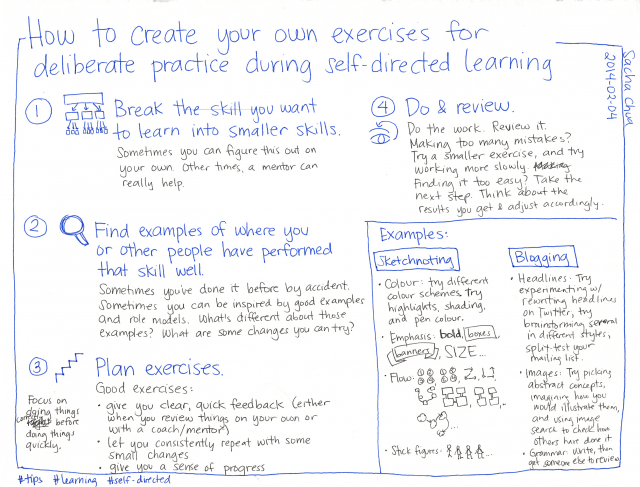More tips for self-directed learning: deliberate practice
Posted: - Modified: | learning, tipsLearning on your own can be really hard. Once you get past the basics, there aren't that many books or courses about what you're interested in. It makes sense. It takes effort to make a book or course, and authors and teachers tend to prefer larger markets. As you gain experience, you need more specialized knowledge, and it can be hard to find existing packaged information or people who can give you good feedback. People around you might not know what you're talking about, and you might not be able to find mentors in the same city. Even figuring out what you want to learn and in what order can be challenging, especially if you're learning about the intersections of topics instead of just one topic. Here are some tips I've picked up for learning on your own:
Look for inspiration. Find people who are doing what you want to be doing. Ask yourself: What do you like about their work? What do they do differently? How can you learn from them? They might never write a book or teach a course–they might not even recognize that what they do is worth teaching others–but you can still learn from their example. You can learn by watching them, and you can even reach out and talk to them.
Review your work. Try to find examples where you've already done what you want to do, even if it was by accident. Ask yourself: What did you do well? What did you like about it? What was different? What can you improve on next time? Look for ways to deliberately practise the skills you want to develop.
Make your own maps. If you're learning about something that doesn't have a clear outline or curriculum, it's easy to feel scattered and discouraged. Make your own map. List your questions, and keep track of your progress as you answer them. Figure out what the next steps are. You might be able to ask mentors to help you make a better map. Mentors can tell you if there are easier ways to learn something, or if there are related topics that you would find useful. Make your own curriculum so that you don't feel lost.
If you're learning about things on your own, you'll probably need to come up with your own ways to practise what you're learning so that it becomes part of the way you work. Instead of being intimidated by the size of what you want to learn, break it down into smaller skills that you can practise. Look for ways that you or other people have done it well, and plan your own exercises so that you can learn how to do well consistently. Deliberate practice is the key towards building confidence and skill. Think about how you can practise that skill in a way that gives you quick feedback on whether you're doing it right or wrong. You might be able to check your work on your own, or this might be something a coach or mentor can help you with. Keep track of how you do on these exercises – it's great to feel your progress.
If you're having a hard time with the exercise you've come up with, break it down into smaller pieces and try working more slowly. Improve your accuracy and consistency before you improve your speed. If you find the exercise too easy, take the next step. Think about the results you're getting and adjust the way you practice. Good luck!



3 comments
benoithamelin
2014-02-10T14:12:51ZI like the ideas of making a map of things to learn, as well that of deliberate practice. About the former, in the beginning of the year, I took my large, discouraging backlog of books, and made a shortlist of twelve books I'd like to read first. I set myself the objective of reading through this shortlist before the end of 2014. With hindsight, I feel this list was too long, because of two reasons. The first is that I realize that I'd rather read slowly, taking notes and writing up problems and exercises, than blaze through a book, not remembering one thing from it.
The second is that I also started practicing my programming skills deliberately, and the time required for that eats into the time alloted for "heavy," learning-intensive reading. As for sports and music and any worthy skill, deliberate practice requires setting time aside to do it *regularly*.
I can afford to dedicate one hour each weekday for skill enhancement, either through practice or reading. The schedule I've found to work for me is to alternate between each activity, each week: one week of coding and writing up about it, one week of reading and writing up about it. These two activities fuel me with the best blog fodder I've had for a long time. :-D
sachac
2014-02-11T02:57:19ZThat's one of the reasons why I've been experimenting with moving away from self-imposed deadlines and moving towards focusing on processes instead. I'm glad you found a balance that works well for you! I like switching between different activities, too. I figure that it's okay to learn in a spiral, and taking notes makes it much easier.
Mindey
2014-02-11T11:05:47ZA... Nice number of posts! ^^ Very good advice. I found myself thinking and working towards a very similar direction that you do...